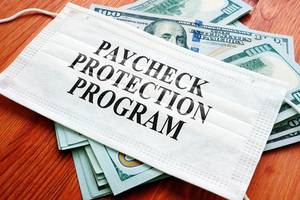 According to the Washington Post, more than 100,000 small businesses in the U.S. have closed permanently due to hardships caused by COVID-19. A study by researchers with the University of Illinois, Harvard Business School, Harvard University, and the University of Chicago, at least 2 percent of small businesses are gone for good. Three percent of the nation’s restaurants have also closed, according to the National Restaurant Association.
According to the Washington Post, more than 100,000 small businesses in the U.S. have closed permanently due to hardships caused by COVID-19. A study by researchers with the University of Illinois, Harvard Business School, Harvard University, and the University of Chicago, at least 2 percent of small businesses are gone for good. Three percent of the nation’s restaurants have also closed, according to the National Restaurant Association.
Although Congress approved an allowance of $700 billion to support small businesses when they passed the Coronavirus Aid, Relief, and Economic Security (CARES) Act, many small business owners have yet to receive aid.
The Small Business Association (SBA), which is issuing some emergency funding to businesses in the form of Paycheck Protection Program loans and grants, has deemed individuals with criminal records ineligible for some loans. Yet, there are no provisions in the CARES Act that Congress passed that excludes them from seeking financial relief.
How Denial of Small Business Loans is Hurting Communities
An Arizona couple with a hardwood flooring company recently applied for a small business loan. The woman applying for the loan was surprised to see a question seeking whether any of the business owners had pleaded guilty to or been on probation for a criminal offense. Immediately, her husband came to mind. He had been placed on probation for pleading guilty to theft for an action he claims was a mistake. She is now concerned they may not be able to keep their five employees, who have been with them for 18 years. People who, she claims, “are like family.”
It is not out of place for the SBA to review loan applicants’ criminal records and determine whether an applicant is “of good character.” This is because banks conduct background checks as part of their loan process. After a disaster, there is a higher chance of people seeking loans in bad faith, and the SBA and banks have placed safeguards to avoid this outcome. Until now, there has not been such an urgent need to give businesses cash quickly without giving them extra hoops to jump through.
It is also a time when people on all points on the political spectrum generally agree that people with criminal records should receive a second chance, particularly people creating jobs. Many business owners with varying criminal histories are also unsure of whether their particular convictions may prevent them from seeking financial aid.
How Does the CARES Act Keep Small Businesses Afloat?
The CARES Act provides two kinds of loans for businesses with 500 or fewer employees. One is the Paycheck Protection Program, intended to help companies keep their employees. There is also an expansion of loans for companies hurt financially by disasters. Applications for both programs are asking about criminal records, discouraging many business owners from seeking necessary funds.
As one pet supply store owner in New Jersey with a 10-year-old conviction put it,
“It’s as if, after Hurricane Katrina flooded New Orleans, rescuers flying in helicopters asked families stranded on their roofs if they had ever faced a criminal charge. And if anyone answered yes, they would move along to the next house.”
So far, about 4.2 million businesses have received emergency loans from the SBA — a small portion of the 30 million small companies that may need it.
Hire a West Palm Beach Record Sealing and Expungement Lawyer
If you have a criminal record for a nonviolent offense, you might be eligible to have your conviction expunged in Florida. There is no time to seek an expungement, although you may only seek one in your lifetime.
Attorney Brian P. Gabriel of The Law Office of Gabriel & Gabriel has more than 30 years of experience helping individuals accused and convicted of criminal offenses seek a better future. If you seek to seal or expunge your record in West Palm Beach, contact Brian Gabriel by calling (561) 622-5575 or complete a contact form for a free consultation.


